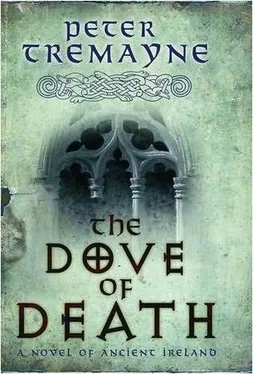Peter Tremayne - The Dove of Death
Здесь есть возможность читать онлайн «Peter Tremayne - The Dove of Death» весь текст электронной книги совершенно бесплатно (целиком полную версию без сокращений). В некоторых случаях можно слушать аудио, скачать через торрент в формате fb2 и присутствует краткое содержание. Жанр: Исторический детектив, на английском языке. Описание произведения, (предисловие) а так же отзывы посетителей доступны на портале библиотеки ЛибКат.
- Название:The Dove of Death
- Автор:
- Жанр:
- Год:неизвестен
- ISBN:нет данных
- Рейтинг книги:5 / 5. Голосов: 1
-
Избранное:Добавить в избранное
- Отзывы:
-
Ваша оценка:
- 100
- 1
- 2
- 3
- 4
- 5
The Dove of Death: краткое содержание, описание и аннотация
Предлагаем к чтению аннотацию, описание, краткое содержание или предисловие (зависит от того, что написал сам автор книги «The Dove of Death»). Если вы не нашли необходимую информацию о книге — напишите в комментариях, мы постараемся отыскать её.
The Dove of Death — читать онлайн бесплатно полную книгу (весь текст) целиком
Ниже представлен текст книги, разбитый по страницам. Система сохранения места последней прочитанной страницы, позволяет с удобством читать онлайн бесплатно книгу «The Dove of Death», без необходимости каждый раз заново искать на чём Вы остановились. Поставьте закладку, и сможете в любой момент перейти на страницу, на которой закончили чтение.
Интервал:
Закладка:
Bleidbara sounded confident enough.
‘And when we do meet up with them, what then? What if they want to fight?’ asked Eadulf. ‘I’ve never been in a real sea battle before.’
Bleidbara smiled grimly in the semi-darkness and looked towards Heraclius.
‘We have the wild ass already in place at our bow. Then we will see if that little invention is what it claims to be. If it is not, it will be a contest to see if our bows are stronger than their bows, our arrows more powerful than their arrows.’
‘The wild ass?’ Eadulf peered at the bow, but in the darkness all he could see was the curious canvas-covered wooden frames that had been brought aboard the previous afternoon.
Heraclius touched him on the arm and pointed at the covering.
‘The onager is a form of catapult used by the Roman legions. They called it the wild ass because, when the projectile is released, the engine that fires it kicks back like a mule,’ he explained. ‘I have trained some men to use it, and I’m hoping that we don’t have to come to close quarters to fight the enemy ship. The range of the weapon is about three hundred to three hundred and fifty metres.’
‘You hope to hole the ship by throwing rocks at it?’ Eadulf had heard that the Romans had used such engines in siege war, but never on shipboard.
Heraclius just smiled mysteriously and shook his head.
Eadulf, during the period that followed, had cause to feel regret that he had come on such a voyage. He was not the best of sailors and now the excitement of the first part of the chase began to wear off, he realised the stark truth: he was on a vessel, ploughing across dark waters, en route to engage a ship that would obviously fight back. He was anxious but knew that showing anxiety would not be advisable; at this time he must feign the same indifference that Bleidbara and Heraclius appeared to be displaying. He had never seen two ships engage one another on the sea before, and he anticipated that it would be fierce and bloody. His calling as a religious would not protect him in this battle. He wondered whether he should ask Bleidbara what he should do when the attack began, but them compelled himself to refrain from comment.
The vessel was moving along at a fast pace now as a south-westerly wind, coming off the land, caught the sails. A white ribbon of sea foam was spreading on either side of its bows, almost phosphorescent and clearly visible in spite of the darkness. But the darkness was now vanishing. The moon was still well above the horizon but had become a pallid white orb, a wispy blob of sheep’s wool in the pale sky. The coastline of the peninsula was close to their portside, a dark, impenetrable line of trees and hills. To the starboard, the humps of islands were now rising out of the early-morning mist that hung across the Little Sea. The helmsman appeared to know the waters well even in the darkness, skilfully moving the helm a point or two to avoid submerged rocks, judging his distance from points Eadulf could not even see.
Bleidbara suddenly shouted an order and one of the men leaped agilely to the rigging and went up to the top of the main mast. After a few moments he called down and Bleidbara’s mouth tightened a little at his words.
‘The trouble is,’ he confided to Eadulf, ‘we have the dawn rising at our backs. They will see us coming if they are directly ahead of us — and before we ourselves get close enough to see their sails. I have put a man up there to see if he can spot any sign of them.’
Eadulf knew enough to realise that the height of the mast gave an advantage in sighting a vessel across the water that would otherwise be hidden from those on the deck.
They sailed on in silence for a while, the tension growing among the crew. There was a cry from the masthead.
‘There’s Er Lannig now,’ grunted Bleidbara. ‘We’ll keep it to port and come north-west of it.’ He gave a sharp order to the helmsman. ‘We have to steer clear of the southern tip — there are submerged standing stones there.’
As the ship swung further north, Heraclius explained: ‘The island seems to have been a centre of pagan worship. I have come exploring here before. There are the remains of two stone circles. Do you see them?’
Eadulf could just see the silhouettes of jagged stones, curving into the sea.
‘One circle is entirely submerged, but one of the stones remains very dangerous. Local fishermen call it the blacksmith’s stone,’ Bleidbara went on. ‘It could tear the bottom out of a ship like this.’
Now the dawn had become a reality, not with rich reds and golds but with a pale watery hue that seemed to foretell rain to come. The sun was well hidden behind a growing pack of pale clouds, but it was now clear enough to see for some distance — and all eyes swept the sea around them.
‘We’ll turn for the Island of Goats,’ called Bleidbara, pointing ahead.
Another shout from the masthead made them all look up.
Eadulf did not understand what the lookout was saying but his arm was thrust out more to the north of them. He looked but couldn’t see anything.
Bleidbara slapped his thigh with a grin.
‘There she is, just where I expected her to be. She is heading south towards us.’ He glanced up at the sails. ‘But we should have the wind with us. Take a care for yourselves, my friends, as we will soon be upon them.’
There was now a shout from the maindeck and Eadulf turned and saw a ship materialising across the water. Her sails were fully rigged but they hung almost useless in the prevailing wind. The ship was pitching and moving without elegance as it sought to make headway.
It seemed that they had been spotted, for there was movement on the oncoming ship. Its bows seemed to move as if it were trying to turn away.
‘They are wearing ship,’ muttered Heraclius. ‘Trying to turn,’ he added for Eadulf’s sake.
Indeed, the ship was jerking idly backwards and forwards. It seemed that those on board had been surprised by the appearance of Bleidbara’s vessel moving rapidly towards them, heaving and plunging as the wind grew stronger. The water was gushing under her bows; the plumes of white froth spreading more widely as she raced across the gap towards the sea-raider.
‘Time to get ready!’ Bleidbara shouted to Heraclius.
The young man nodded, and with a quick, ‘Good luck,’ to both Bleidbara and Eadulf, he made his way for’ard to where the wild ass was being uncovered by some of the crew.
Eadulf had never seen a machine like it before. At first it seemed to consist of a triangular frame of dark oak whose base was fixed firmly on the deck. At the front end was a vertical frame of solid timber; through this frame, Eadulf noticed an axle that had a single stout upright spoke inserted through a skein of twisted rope. At the end of the spoke was a leather thong or sling. The axle or horizontal barrel was rotated by a crank which forced the vertical spoke backwards almost to a horizontal position. He had heard something about these Ancient Roman engines. A stone would be inserted into the sling and the vertical arm released, usually by the person in control, using a mallet to knock out the securing pin, which held the arm. Thus released, with such pressure provided by the tension of twisted rope, the arm went up and would throw the stone or rock for a considerable distance.
He could see Heraclius examining and checking the engine. Then he said something to one of his men. Two of them disappeared below decks and came back carrying the wooden box carefully between them. It was obviously heavy and they placed it cautiously by the engine. Heraclius bent down and opened it and extracted one of the large clay balls that Eadulf had seen in the apothecary’s stone hut.
Bleidbara gave a warning shout to Heraclius and pointed to the oncoming ship.
Читать дальшеИнтервал:
Закладка:
Похожие книги на «The Dove of Death»
Представляем Вашему вниманию похожие книги на «The Dove of Death» списком для выбора. Мы отобрали схожую по названию и смыслу литературу в надежде предоставить читателям больше вариантов отыскать новые, интересные, ещё непрочитанные произведения.
Обсуждение, отзывы о книге «The Dove of Death» и просто собственные мнения читателей. Оставьте ваши комментарии, напишите, что Вы думаете о произведении, его смысле или главных героях. Укажите что конкретно понравилось, а что нет, и почему Вы так считаете.











